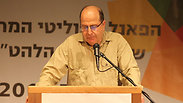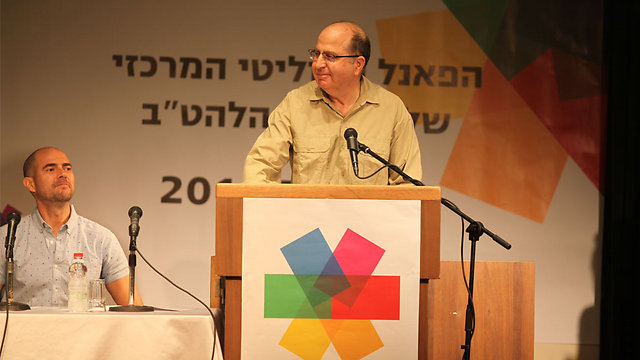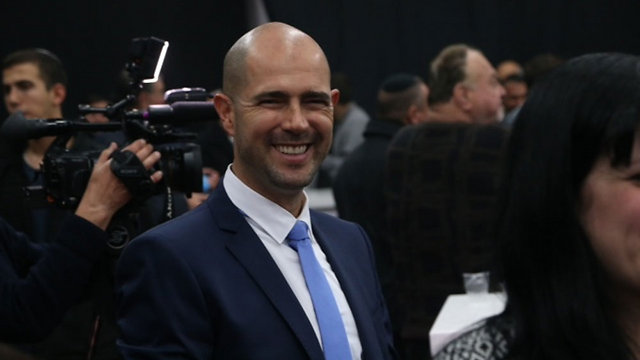

Defense Minister Moshe Ya'alon committed to promoting same-sex marriages in the next Knesset at a political panel held by the LGBT community in Tel Aviv on Friday morning.
"The community's members must be allowed to have a family life that includes marriage. This is a basic human right regardless of religion, race, gender or sexual preference," Ya'alon said.
The Likud candidate said he hoped the 20th Knesset, which will be elected on March 17, will advance new legislation for the LGBT community.
"It is our duty to allow the members of the community to start a family, raise children, live, make a living and contribute to Israeli society. I hope that the next Knesset passes laws that allow the members of the community to do just that," he added.
Representatives from the different political parties took part in the panel to discuss their positions on issues important to the community - primarily marriage rights. Yesh Atid leader Yair Lapid, Tzipi Livni from Zionist Camp and Meretz chairwoman Zehava Gal-On also participated.
"Over the last few decades, the world has moved forward towards full equality," Ya'alon said. "Unfortunately, when we talk about equal rights, you (LGBT community), as those perceived in society as different, suffer from inequality in quite a few areas. Israeli society is on the right path, but it's not enough."
He admitted that Likud members have, in the past, led a strict policy against the LGBT community. "We had other elements who were trying to force a way that's not acceptable to the movement. The voters have shown what is the way most of the Likud's public supports."
Yesh Atid leader Yair Lapid said at the panel that "as long as the LGBT community doesn't get equal rights, I am not living in a country in which I want to live. Equal civil marriages to all. This is a civil revolution that will allow any couple to make their union official, with all of the rights this entails. This won't pass easily, as this is a political revolution and a political war."
Lapid also made a commitment to members of the community, saying "we will pass the civil marriage bill just as we passed the burden equality law and just as we decreased the amount of ministers, because it's just and right."
Meanwhile, Meretz leader Zehava Gal-On criticized civil marriage for the LGBT community. "Civil marriage is a rotten compromise that was made between Yesh Atid and Bayit Yehudi so that they could transfer money to settlements, while not approving civil marriages. We are left with a government that abandoned the diplomatic process, built in the settlements, which may have had some achievements in terms of the LGBT community, but the bigger issue of civil marriage was sold off to Bayit Yehudi. These coming elections are not a fight between left and right, but rather between those who want democracy and those who want to dismantle it. Pluralism threatens these zealots."
Zionist Camp leader Tzipi Livni slammed the members of Bayit Yehudi for their past comments against members of the LGBT community. "It was only last night that Netanyahu tweeted that Bayit Yehudi will be a part of his next government, and it's fortunate this government won't be formed," she said. "My parents raised me on equality and they're proud of me for calling to not support dark parties."
'Less politically involved'
Ya'alon's promises stand in stark contradiction to the expected representation of members of the LGBT community in the next Knesset, or rather the lack of such representation. Barring any unexpected changes, there will be no openly declared members of the LGBT community in the next Knesset. MK Nitzan Horowitz recently announced he was quitting Meretz and that he will not run in the upcoming elections, while the head of the LGBT faction in the Likud, Amir Ohana, will have to hope his party gets 32 mandates in the upcoming elections to be elected to Knesset.
Dr. Amit Kama, a communications researcher from the LGBT community, claims that to a certain extent, the relative comfort members of the LGBT community enjoy today is what decreases their political involvement.
"We've reached very nice achievements politically and these achievements have been translated into a comfortable life for more gays and lesbians - except for the issues of marriage and adoption. The younger generation doesn't deal with questions of legal discrimination like my generation had to, and that's why their political involvement has decreased significantly. I grew up in a generation in which homosexual relations were a criminal offense. People knew there was a law against their own existence, so they were more politically involved. I personally can't understand this lack of participation from the Israeli homo-lesbian community."
Do they have any electoral power?
"The LGBT community has power, definitely political power. When you hear 'the community,' you immediately think about gays who live in central Tel Aviv. But there are gays and lesbians living in all sorts of places, like development towns or kibbutzim, and haven't come out of the closet. The political map is generally divided between the conservative camp and the liberal camp. The rightwing conservative camp usually avoids introducing gays and other minorities into its ranks, while for the liberal camp it's an electoral asset."
A report by the Israeli National LGBT Task Force's research department that analyzed parliamentary support for the LGBT community showed that in the last Knesset's 20-month term, only one percent of 3,000 bills addressed LGBT issues. These bills included one that dealt with the definition of discrimination based on sexual orientation, another suggesting a ban on discrimination based on gender identity, and a bill on listing a gay or lesbian partner as a parent in the civil registry. About 55 percent of MKs received a grade of "failed" or "insufficient" for their treatment of LGBT issues.
A breakdown of the average grade based on party factions put Meretz, Hadash, Labor, and Yesh Atid in the lead, while Likud, Yisrael Beytenu, and Shas lagged behind, with Bayit Yehudi coming in last. The MKs with the highest grades were from Meretz, with Nitzan Horowitz leading the pack. At the other end of the spectrum, the lowest grades were received by MKs from United Torah Judaism and Orit Struck of Bayit Yehudi. The report further stated that MK Ayelet Shaked of Bayit Yeudi helped forestall pro-LGBT legislation, and that Bayit Yehudi Chairman Naftali Bennett actively obstructed government legislation in favor of the community.
The makeup of the next Knesset could create a worst situation for the community, as LGBT representatives were relegated to the sidelines. Yesh Atid slotted openly gay Zehorit Sorek in the unrealistic 19th spot. Meretz, the party most associated with the gay community, assigned LGBT candidates below the top ten seats. Likud's Amir Ohana, the head of the party's gay forum, was put in the 32nd spot. The Zionist Camp, Yisrael Beytenu, Kulanu, and Bayit Yehudi had no LGBT representation at all.
Gay, religious, and right-wing
Mickey Gitzin, a Tel Aviv municipal council man (Meretz), and 22nd on the list for Knesset, said that "there is a politics of identity, and there is an understanding that straight, Ashkenazi men cannot represent everyone. Women, Mizrahi Jews, and Arabs must be represented, as should LGBT people. No one can claim that he fully represents a community if he is not a part of it, and it's therefore clear that the lack of LGBT representation in Meretz surprised many of its voters, and it's a shame that there is no such representation."
How did there end up being no representation?
"Meretz was the first party to have openly LGBT representation—Nitzan Horowitz. He announced his retirement too late, once it was no longer to announce a candidacy, so other LGBT community members who believed they already had significant representation chose not to run, and Meretz has no reserved spots.
"I don't think it will damage the party, because Meretz has been committed to the community for years, before the centrist parties dressed up in our agenda. LGBT representation is in all of the party's institutions and its management. You won't find MKs who remain silent on the issue in our party, as other parties do."
Amit, the chairman of the Kamoha organization for gay Orthodox Jews said he intented to vote for Bayit Yehudi. "I do not think they are homophobic, despite the fact that there were also wretched remarks in their video," he said. "As a religious person, I don't only do what I want or think, there is also the Halacha to consider. If Bayit Yehudi was a homophobic party by definition, I would vote for them, because I'm gay and religious but I'm many other things – against a Palestinian state, and want to preserve the world of Torah.
"Even if they damage my right to have a child or get married, the Israeli people and the Torah take precedent over my wishes. As a religious homosexual, there is no party that speaks to me in its messages. There are parties that speak to gays, like Meretz and Yesh Atid, but they are far from my views on other issues."
Amir Ohana, chairman of Likud's gay forum, said he thought he was in a realistic spot on its list. "Benny Begin can bring more seats than Amir Ohana, and even if the prime minister had put me in the 11th spot, the entire community wouldn't have thronged to us." He added that "historically, LGBT activism has indeed been the province of the elft, but since 2011, when we formed the gay forum in Likud, that situation has changed."
How much have you courted the gay vote?
"In the previous election we participated in panels, brought Limor Livnat and Reuven Rivlin, and added a stipulation to the party constitution to prevent discrimination based on sexual orientation. The community has historically voted for the left because it was the left that spoke to them, but as I said, that has changed. Likud also speaks to gays and lesbians, and those who have a right-wing viewpoint but didn't vote for us because of LGBT rights will now feel they have a home."
















